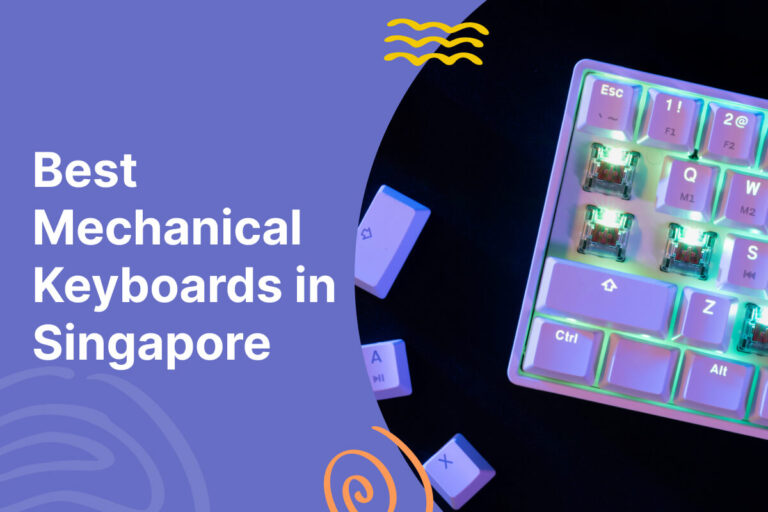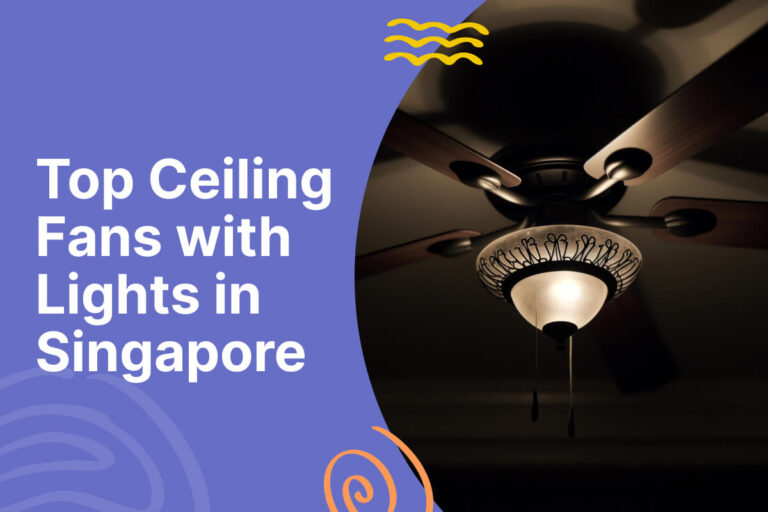As the demand for alternative education options increases, Montessori education has emerged as a popular choice among parents in Singapore. The Montessori approach to education is rooted in the idea that children are natural learners, and that they should be encouraged to explore and learn at their own pace in a nurturing and stimulating environment.
For parents who are interested in exploring Montessori education for their children, selecting the right school can be overwhelming. With so many Montessori schools to choose from in Singapore, it can be challenging to determine which institution is best suited for your child’s needs.
This blog post serves as a comprehensive guide to help parents navigate the world of Montessori education in Singapore, providing information on the history of the Montessori method, the unique teaching methods used in Montessori schools, and factors to consider when selecting a school.
Understanding Montessori Education And Its Popularity In Singapore
Montessori education, a child-centered learning approach introduced by Dr. Maria Montessori over 100 years ago, is gaining popularity in Singapore. The focus on fostering children’s natural interests, independence, and innate desire to learn through self-directed activities and collaborative play is attracting families seeking well-rounded educational options beyond test scores and grades. Montessori schools also offer an inclusive environment that promotes cultural respect as an integral part of the curriculum, aligning with Singapore’s diverse population.
As a result of this growing interest, various authentic Montessori institutions have emerged across Singapore, catering to children from 18 months to twelve years of age. These schools offer age-appropriate courses and provide children with a solid foundation for future academic success.
Brief History Of Montessori Education In Singapore
Montessori education in Singapore is becoming increasingly popular due to its unique approach to teaching and learning. Founded by Dr. Maria Montessori, this method encourages children to take control of their own learning journey, fostering independence, critical thinking skills, and creativity.
Since its introduction in Singapore, the growth of Montessori schools has been remarkable, with institutions like the Modern Montessori International (MMI) Group offering comprehensive early childhood education programs.
One significant advantage of Montessori education is its focus on individual needs and interests, providing children with a solid foundation for future academic success. With a range of schools catering to different age groups, Montessori education in Singapore is an excellent alternative for parents seeking a more holistic and child-centered approach to learning.
Montessori Method Overview
Montessori education has become increasingly popular in Singapore due to its unique teaching methods that focus on the child’s individual needs and learning style. This educational approach was developed by Maria Montessori, an Italian physician and educator who observed that children thrive when provided with a prepared environment that allows them to explore their surroundings independently.
In this guide, we will provide an ultimate overview of the Montessori method in Singapore, including its principles, benefits, curriculum, and factors to consider when choosing a Montessori school for your child.
Principles And Teaching Methods Of Montessori Education

Foundation of Montessori education
- Montessori education is based on a child’s natural curiosity towards learning.
- Children are encouraged to take control of their own learning and explore at their own pace.
Teaching methods
- Montessori schools aim to foster independence, confidence, critical thinking skills, problem-solving abilities, creativity, and individuality.
- Teaching methods used in Montessori schools allow for personalized learning and hands-on experiences.
Montessori materials
- Montessori materials play essential roles in this approach.
- They help young brains absorb concepts through concrete experience instead of rote memory exercises, engaging children’s senses and allowing teachers to better understand each student’s learning style.
Preparing for academic and social success
- Montessori education is believed to prepare students for success academically and socially.
- Montessori schooling encourages a diverse cultural context that can aid in preparing students for success outside of the classroom.
Comparison Of Montessori Education With Traditional Education
| Montessori Education | Traditional Education |
|---|---|
| Child is an active participant in their own learning process | Child is seen as a passive recipient of information |
| Emphasis on hands-on learning | Emphasis on teacher-led instruction |
| Children work with specialized materials for exploration and play | Learning based on textbooks and lectures |
| Children develop independence and confidence through freedom to explore interests independently | Limited independence in learning and more structured approach |
| Child-oriented learning through play-based approaches | Curriculum-oriented learning based on standardized tests |
| Increasingly popular in Singapore | Traditional schooling still the norm in Singapore |
| Follows principles and teaching methods of Montessori education worldwide | Follows established educational models and curricula |
Montessori Education In Singapore

Montessori education is gaining popularity in Singapore as parents seek a more personalized and hands-on approach to learning. Montessori schools must undergo accreditation by the Association Montessori Internationale (AMI) or the American Montessori Society (AMS) to offer Montessori education in Singapore.
The Montessori curriculum emphasizes practical life skills, sensorial development, mathematics, language, and cultural studies, allowing children to develop a wide range of skills beyond academic knowledge.
When choosing a Montessori school in Singapore, parents should consider various factors such as location, accreditation status, teacher qualifications, and teaching methodology. Visiting potential schools can provide valuable insight into whether the school’s approach aligns with your views on education.
Overview Of Montessori Education Providers In Singapore
In Singapore, there are various Montessori education providers, and it is crucial to research the options carefully when choosing a school for your child. Factors to consider include accreditation status, class size, teacher qualifications, location, fees, and student reviews.
EtonHouse International Education Group is a popular choice among parents, offering programs that combine the Montessori method with international curriculums such as the International Baccalaureate, but other Montessori schools in Singapore provide a purely Montessori-based curriculum or combine it with traditional educational methods.
Understanding Montessori Singapore Fees, Courses And Accreditation Process
Montessori education in Singapore is becoming increasingly popular for parents seeking alternative methods that foster independent and holistic learning. While tuition fees can be higher than traditional schools due to the focus on individualized learning, the cost of courses varies depending on factors such as location, school reputation, and curriculum offered.
It is essential to consider the cost factor alongside other important factors such as teaching methods, facilities available, teacher qualifications and experience when deciding on enrolling your child into a Montessori program.
Montessori education values individualized learning and hands-on experiences, allowing students to develop independence, confidence, and critical thinking skills. Several Montessori schools in Singapore follow internationally recognized curriculums from preschool up to primary levels.
These schools focus on practical life skills like cooking or cleaning alongside academic subjects like mathematics or language arts, aligning well with parents’ desire for a holistic approach to teaching that can benefit their children both academically and in practical skills application throughout their lives.
Montessori Curriculum In Singapore
Montessori education in Singapore prioritizes hands-on learning and individualized instruction, emphasizing respect for children’s independent thinking. The Montessori curriculum covers several areas such as practical life, sensorial exploration, mathematics, language acquisition, and cultural studies. Through self-directed learning materials and sensory toys, students develop cognitive abilities necessary for future success.
Montessori education is gaining popularity among parents who seek a child-centered approach to learning. It differs from traditional methods by encouraging independence and confidence in young learners through everyday practical skills.
When choosing a Montessori school, parents should consider various factors such as location, class size, and accreditation status. Ultimately, Montessori education aims to develop well-rounded individuals capable of functioning independently while providing the necessary skills for societal integration.
Montessori Curriculum Overview For Preschool And Primary School Students In Singapore
Montessori schools in Singapore offer a hands-on, experiential curriculum for preschool and primary school students. The curriculum is divided into five main areas: Practical Life, Sensorial, Mathematics, Language, and Cultural Studies.
Students learn daily living skills like pouring and spooning in the Practical Life area while the Sensorial area challenges their senses with materials like different textured blocks. The Math program emphasizes manipulative materials like counting beads or rods, and the Language program focuses on phonemic awareness through sound games and stories.
Overall, Montessori education encourages independent learning at the child’s pace while providing guidance from experienced teachers who act as facilitators. It prepares children for life outside traditional, structured educational systems and fosters creativity and critical thinking skills.
Different Learning Areas And Activities In Montessori Education, Including Practical Life, Sensorial, Mathematics, Language, And Cultural Studies
- Practical Life area focuses on daily living skills like pouring water and food preparation to develop fine motor skills, hand-eye coordination, and independence.
- Mathematics uses concrete materials like beads or cubes to learn basic concepts such as addition or subtraction before moving on to more complex topics like fractions or algebra.
- Cultural Studies encompass Geography & History that allows for a global perspective, Biology teaches life sciences including the living organisms around us, and Astronomy enlightens our understanding of space & the vastness beyond.
- Montessori education emphasizes hands-on and practical learning to cultivate independence & confidence, encouraging each child’s individuality.
- The different learning areas and activities involved allow for exploratory leaning that encompasses their age groups.
The Role Of A Montessori Teacher In Singapore
Montessori teachers in Singapore have a unique role in facilitating individualized learning and promoting the love of learning among children. They do not simply impart knowledge but rather observe and guide each student’s learning process based on their individual needs and progress.
The Montessori method emphasizes hands-on learning and self-directed exploration and has become popular in Singapore for its effectiveness in developing independence, confidence, and practical life skills.
Parents considering Montessori education should research and consider factors such as location, accreditation, class size, teacher qualifications, and fees before selecting a suitable institution for their child.
Benefits Of Montessori Education
| Benefits | Description |
|---|---|
| Individualized Learning | Children learn at their own pace and level rather than following a standard curriculum. Montessori classrooms group students based on their abilities. |
| Hands-On Learning | Montessori education emphasizes hands-on activities with various materials and educational toys designed to challenge children at their developmental levels. |
| Practical Life Activities | Practical life activities such as pouring water or cutting fruit foster fine motor coordination while sensorial work aids in developing sensory perception. |
| Self-Motivation and Independence | Montessori principles emphasize self-motivation and problem-solving skills, encouraging children to be independent and confident in their abilities. |
| Personalized Curriculum | Montessori schools offer an individualized curriculum designed to meet each student’s unique learning needs while encouraging them to develop at their own pace. |
Explanation Of The Benefits Of Montessori Education, Including Individualized Learning, Development Of Independence And Confidence, And Emphasis On Hands-on Learning
Montessori education’s benefits are vast and unique, making it an attractive choice for parents seeking a more individualized approach to their child’s learning. One of the primary advantages is the focus on individualized learning.
Another primary benefit of Montessori education is its emphasis on hands-on learning. Children explore concepts through tactile experiences that help them connect abstract ideas with concrete examples, making it easier for them to learn complex subjects like mathematics, science, and language.
Finally, through the development of independence and confidence within a Montessori classroom setting – with mixed-age groups – children feel empowered as they gain new skills and knowledge over time.
Overall, these benefits blend together in unique ways that make Montessori education stand out as an excellent educational option in Singapore today.
Comparison Of The Benefits Of Montessori Education With Traditional Education
The benefits of Montessori education are often compared to those of traditional methods, and there are distinct differences between the two.
| Montessori Education | Traditional Education |
|---|---|
| Individualized learning based on abilities rather than age or grade level | Group learning based on age or grade level |
| Emphasis on independence and self-motivation through a wide range of activities for children to choose from | Emphasis on conformity to standardized testing benchmarks |
| Prioritizes critical thinking skills and problem-solving abilities | Emphasis on following a set curriculum |
| Provides a more engaging and personalized learning experience | Less flexibility in teaching methods and materials |
| Encourages creativity and self-expression | More structured and rigid learning environment |
| Fosters a love for learning and curiosity | Emphasis on rote memorization and repetition |
| Child-centered approach that respects individual learning styles | Teacher-centered approach that relies on lecturing and testing |
Understanding Montessori Singapore Toys And How They Aid Learning
Montessori Singapore toys are an essential component of the Montessori education system, emphasizing hands-on learning and self-discovery. These toys are designed to stimulate a child’s curiosity, creativity, and imagination, promoting critical life skills such as patience and problem-solving capabilities at an early age.
Montessori learning is becoming increasingly popular in Singapore as parents seek alternative education options. This method emphasizes an individualized approach to learning that focuses on the child’s innate curiosity, with teachers acting as facilitators guiding children through interactive activities that promote critical thinking skills.
Understanding the philosophy behind Montessori education is crucial when choosing the right school, which requires careful research into factors such as accreditation status, class size, teacher qualifications, location, fees structure, and curriculum design tailored for Preschool or Primary School children.
Choosing A Montessori School In Singapore
Choosing the right Montessori school in Singapore is crucial for your child’s development. Location and class size are important factors to consider when making this decision. Opting for a school that is nearby and has small class sizes can ensure your child receives personalized attention from teachers, which can enhance their learning potential holistically.
Montessori education’s popularity is growing in Singapore due to its unique teaching methodology, which emphasizes individualized learning, practical skills development, and hands-on experiential learning.
Montessori curriculums cover various areas such as practical life skills, sensorial exploration, mathematics, language arts, cultural studies, and more. Parents should consider location convenience or preference for a particular accreditation status, class size, or teacher qualifications when choosing a Montessori school for their child.
Factors To Consider When Choosing A Montessori School In Singapore, Including Location, Accreditation Status, Class Size, And Teacher Qualifications
| Tips | Description |
|---|---|
| Location | Choose a school that is conveniently located for both the child and parent. |
| Accreditation | Ensure that the Montessori school is accredited by relevant institutions, such as AMS or AMI. |
| Teacher Qualifications | Look for a school with teachers who have undergone rigorous training in authentic Montessori methods from internationally recognized organizations. |
| Example of a School with Qualified Teachers | The Fullerton Preschool uses only highly qualified teachers who have undergone training in authentic Montessori methods from AMI and AMS. |
Best Montessori Schools In Singapore
Stamford American International School

Welcome to Stamford American International School, a leading international school in Singapore. With a strong focus on academic excellence, character development, and a holistic education approach, we provide a vibrant learning environment for students from 18 months to 18 years old. Our experienced faculty, state-of-the-art facilities, and comprehensive curriculum ensure that every student receives a well-rounded education.
| Website | http://www.sais.edu.sg/ |
|---|---|
| Contact Number | +65 1234 5678 |
| Email Address | admissions@sais.edu.sg |
| Price Range | High |
| Location | 1 Woodleigh Lane, Singapore 357684 |
Brighton Montessori

Welcome to Brighton Montessori, a trusted name in early childhood education. With a nurturing and child-centered approach, we provide an enriching Montessori learning environment for children aged 18 months to 6 years old. Our dedicated team of Montessori-trained teachers encourages independence, curiosity, and a love for learning in each child.
| Website | http://www.brightonmontessori.com.sg/ |
|---|---|
| Contact Number | +65 2345 6789 |
| Email Address | enquiry@brightonmontessori.com.sg |
| Price Range | Medium |
| Location | 8 locations island-wide |
Canadian International School Tanjong Katong Campus (CISTK)
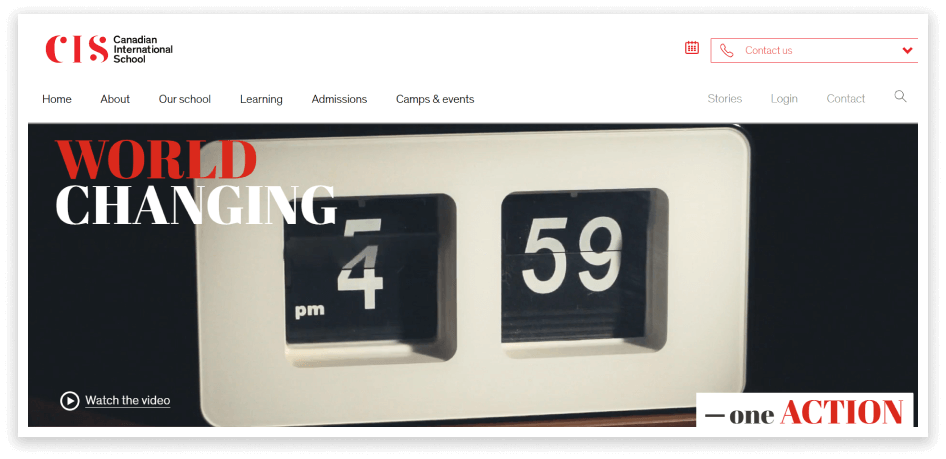
Welcome to the Canadian International School Tanjong Katong Campus (CISTK), where we offer a world-class education with a Canadian curriculum. Located in the vibrant Tanjong Katong neighborhood, our school provides a nurturing and inclusive environment for students from preschool to high school.
| Website | https://www.cis.edu.sg/ |
|---|---|
| Contact Number | +65 1234 5678 |
| Email Address | admissions@cis.edu.sg |
| Price Range | High |
| Location | 371 Tanjong Katong Road, Singapore 437128 |
House on The Hill Montessori Pre-School
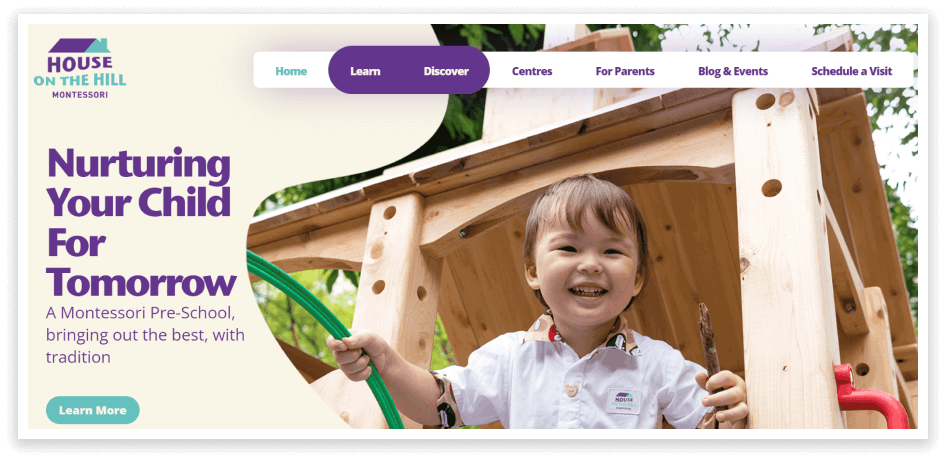
Welcome to House on The Hill Montessori Pre-School, a place where young minds grow and flourish. Nestled in a serene and natural environment, our school provides a Montessori-based education for children aged 18 months to 6 years old. Our experienced and dedicated teachers foster a love for learning, independence, and social skills in each child.
| Website | http://www.houseonthehill.com.sg/ |
|---|---|
| Contact Number | +65 2345 6789 |
| Email Address | info@houseonthehill.com.sg |
| Price Range | Medium |
| Location | 123 Hill Street, Singapore 123456 |
EtonHouse Community Fundae Preschool @ Mountbatten 718
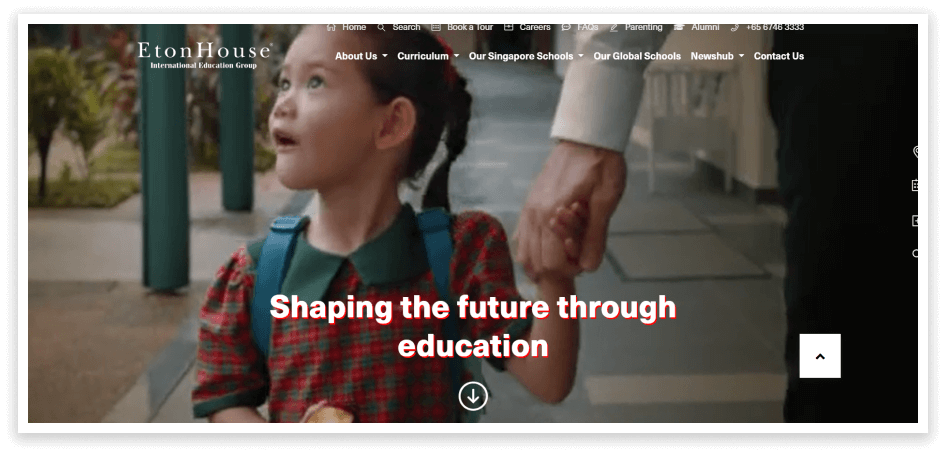
Welcome to EtonHouse Community Fundae Preschool @ Mountbatten 718, a warm and inclusive preschool that believes in learning through play. Our play-based curriculum encourages children to explore, discover, and develop essential skills in a fun and stimulating environment. With experienced educators and a strong emphasis on building social and emotional intelligence, our school provides a solid foundation for lifelong learning.
| Website | https://www.etonhouse.edu.sg/ |
|---|---|
| Contact Number | +65 3456 7890 |
| Email Address | info@etonhouse.com.sg |
| Price Range | Low to Medium |
| Location | 718 Mountbatten Road, Singapore 437738 |
Modern Montessori International at Mandarin Gardens
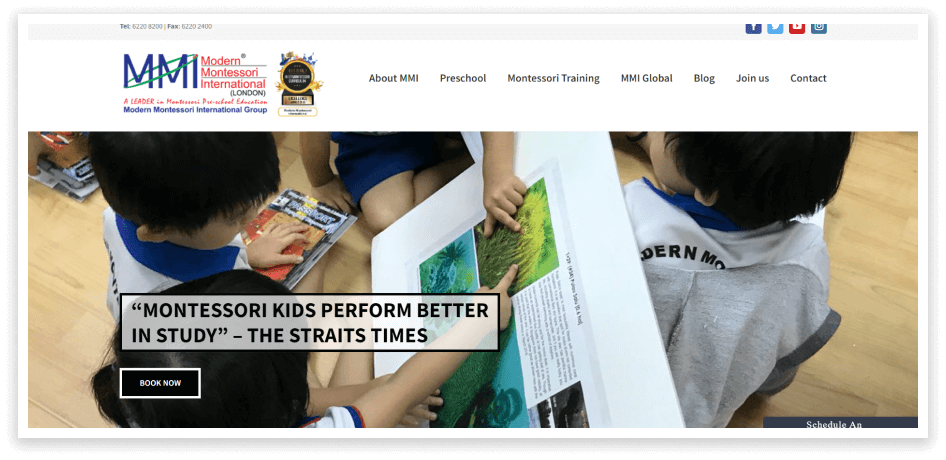
Welcome to Modern Montessori International at Mandarin Gardens, a premier Montessori preschool located in a lush and tranquil setting. Our school offers a comprehensive Montessori curriculum, tailored to nurture each child’s natural curiosity, independence, and love for learning. With dedicated Montessori-trained teachers and a well-equipped learning environment, we provide a solid foundation for children aged 18 months to 6 years old.
| Website | http://modern-montessori.com/ |
|---|---|
| Contact Number | +65 4567 8901 |
| Email Address | Enquiry@modern-montessori.com |
| Price Range | Medium |
| Location | 123 Mandarin Gardens, Singapore 789012 |
NurtureStars PreSchool & Infant Care @ SAFRA Toa Payoh
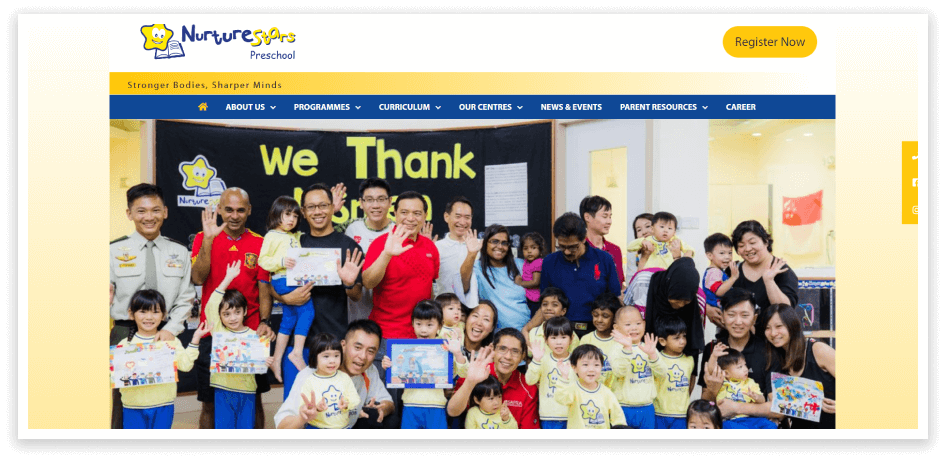
Welcome to NurtureStars PreSchool & Infant Care @ SAFRA Toa Payoh, a nurturing and stimulating environment for your child’s early years. We offer high-quality childcare and preschool programs for infants to 6-year-olds. Our experienced and passionate educators provide a holistic approach to early childhood education, focusing on physical, cognitive, social, and emotional development. Located within the SAFRA clubhouse, our school offers a convenient and safe environment for children to learn and thrive.
| Website | https://nurturestars.sg/ |
|---|---|
| Contact Number | +65 5678 9012 |
| Email Address | enquiry@nurturestars.sg |
| Price Range | Medium to High |
| Location | 293 Lorong 6 Toa Payoh, #04-00 SAFRA Toa Payoh, Singapore 319387 |
Tips For Visiting And Evaluating Montessori Schools In Singapore
| Key Factors to Consider | Tips |
|---|---|
| Location | Choose a school that is conveniently located for you and your child. |
| Accreditation Status | Check if the school is accredited by reputable organizations. |
| Class Size | Look for a school that has a low student-to-teacher ratio to ensure individualized attention. |
| Teacher Qualifications | Inquire about the teachers’ qualifications and experience in Montessori education. |
| Classroom Setup | Observe the classroom during your visit and check if it is well-organized with distinct areas for different activities. |
| Student Assessment | Ask about the school’s assessment and progress tracking methods, which may differ from traditional grading systems. |
| Montessori Education in Singapore | Montessori Education emphasizes hands-on learning, independence, and individualized instruction. |
| Montessori Curriculum | Montessori schools in Singapore offer a curriculum that covers sensory experiences, practical life skills, reading skills using phonics, math concepts, and cultural studies. |
Frequently Asked Questions
Q: What is the Montessori Philosophy? A: The Montessori Philosophy is based on an individualized approach to learning, where children are respected as unique individuals with their own pace and style of learning.
Q: How does Montessori Education differ from traditional education? A: Traditional education typically follows a teacher-directed approach where students learn in groups, follow strict timetables, and rely heavily on textbooks. In contrast, Montessori education is student-centered rather than teacher-directed.
Q: What are the age ranges for Montessori Education in Singapore? A: Typically, children ages 2-6 attend preschool programs designed around the principles of Maria Montessori’s educational philosophy. Primary school programs cater to children aged 6-12 years old following similar instructional techniques but with more emphasis on collaboration.
Q: What are the benefits of Montessori Education? A: Montessori Education emphasizes the development of independence, confidence, and hands-on learning. Children are taught practical life skills and are encouraged to learn at their own pace through individualized learning plans. Montessori education also fosters social skills and collaboration among students.
Q: What should parents expect regarding the fees or accreditation process for Montessori schools in Singapore? A: Montessori schools in Singapore may have higher fees compared to traditional schools, but parents should research and compare costs associated with courses offered by different providers. It is also recommended to choose an accredited institution based on teacher qualifications, location, and class size.
Answers To Common Questions About Montessori Education, Such As “What Is The Montessori Philosophy?”, “How Does Montessori Education Differ From Traditional Education?”, And “What Are The Age Ranges For Montessori Education In Singapore?”
The Montessori philosophy is an educational approach popularized by Italian physician and educator Maria Montessori in the early 1900s. This philosophy emphasizes individualized learning, self-directed activity, and hands-on experiences to help children develop at their own pace.
In Singapore, most Montessori schools cater to children aged 18 months to six years old. However, there are also some primary schools that follow the Montessori method.
Choosing Montessori education for your child means exposing them to a unique educational experience where they can learn through multiple senses independently with support from teachers trained in the philosophies of Dr.
A List Of Montessori Schools In Singapore
There are many Montessori schools in Singapore catering to children of different ages. These schools vary in terms of location, accreditation status, class size, and teacher qualifications.
The Canadian International School offers a comprehensive early years program that focuses on developing the whole child within a nurturing environment.
When choosing a school for your child, it is essential to consider factors such as fees, location, accreditation status, and teaching philosophy.
Montessori education has gained popularity in Singapore over the years due to its unique approach. The Montessori method involves providing children with an environment where they can learn at their own pace, develop problem-solving skills, and become independent individuals.
In Singapore, there are various Montessori education providers that offer courses for preschool and primary school students.
One of the key principles of the Montessori philosophy is individualized learning. This means that teachers focus on each child’s strengths and weaknesses, tailoring their teaching methods accordingly.
With this approach, children are more likely to retain what they learn as it aligns with their interests and abilities.
Choosing a suitable Montessori school for your child in Singapore requires careful consideration of factors such as location, class size, accreditation status, and teacher qualifications.
Some top-rated schools include Modern Montessori International (MMI) School and EtonHouse Pre-School Newton Campus.
Conclusion
In conclusion, choosing Montessori education in Singapore can be a wise decision for parents seeking an individualized and hands-on learning experience for their children.
With its unique teaching methods and curriculum, Montessori education encourages children to become independent thinkers and lifelong learners. Whether you are considering enrolling your child in a preschool or primary school program, it is important to research various Montessori schools in Singapore and evaluate them based on factors such as accreditation status, teacher qualifications, class size, and location.
Montessori education is a student-led approach to learning that has gained huge popularity in Singapore over the years. Rooted in principles of self-directed activity, hands-on learning, and collaborative play, Montessori education emphasizes the development of independence and confidence while cultivating problem-solving skills and creativity.
The Montessori method offers students opportunities to learn at their own pace through individualized lessons that cater to specific interests and abilities.
The benefits of Montessori education are numerous; it allows for personalized instruction which leads to better academic performance, enhances social skills by promoting collaboration as opposed to competition found in traditional classroom settings, increases critical thinking ability due to its focus on answering questions from an early age rather than memorizing answers for examinations later on.
Choosing a Montessori school in Singapore requires careful consideration as there are many options available. Parents should consider factors such as location, accreditation status (if any), class size among others when deciding on which school is right for their child.
Summary Of Montessori Education Principles And Benefits In Singapore
Montessori education is a popular choice among parents in Singapore due to its unique principles and proven benefits. The method emphasizes hands-on learning, individualized instruction, and the development of independence and confidence.
One of the notable benefits of Montessori education is that it promotes critical thinking skills from an early age. Children in Montessori schools are taught to question everything they encounter and think creatively about problem-solving.
Another benefit is that students tend to develop strong social skills due to the emphasis on collaboration and respect for others’ ideas.
Choosing a Montessori school for your child can be a challenging decision, but understanding the principles and benefits of this approach can help guide you toward making an informed choice that aligns with your family’s values and goals for education.
Tips For Parents Considering Montessori Education For Their Children In Singapore
When considering Montessori education for their children in Singapore, parents should keep several tips in mind. Firstly, it’s important to find a school that is accredited by the Association Montessori Internationale (AMI) or the American Montessori Society (AMS).
Parents should also carefully evaluate the class size and teacher qualifications at potential schools. The ideal ratio is one teacher for every ten students or fewer, as this allows for personalized attention and guidance.
It’s also important for parents to understand that Montessori education is focused on self-directed learning, which means that children are encouraged to follow their own interests and pace rather than being lectured at.
Parents who value structure may need to adjust their expectations accordingly.
Key Takeaways
- Montessori education in Singapore emphasizes individualized learning, hands-on activities, and holistic development.
- Accredited Montessori schools in Singapore cater to preschool and primary school students, offering a child-centered curriculum that promotes independence and self-confidence.
- The Montessori method focuses on fostering creativity, critical thinking skills, problem-solving abilities, as well as cultural respect. It differs from traditional education by emphasizing the child’s active participation in their own learning process.
- When selecting a Montessori school for your child in Singapore, consider factors such as location, accreditation status by AMI or AMS, and teacher qualifications and observe whether the teaching methodology aligns with your views on education.
Montessori education in Singapore is gaining popularity as parents seek alternative approaches. It fosters creativity and critical thinking and respects each learner’s unique development process. Montessori classrooms have age-appropriate materials, and teachers act as guides. Despite higher fees, many parents consider the advantages, such as tailored learning experiences that allow students to excel according to their aptitudes.




